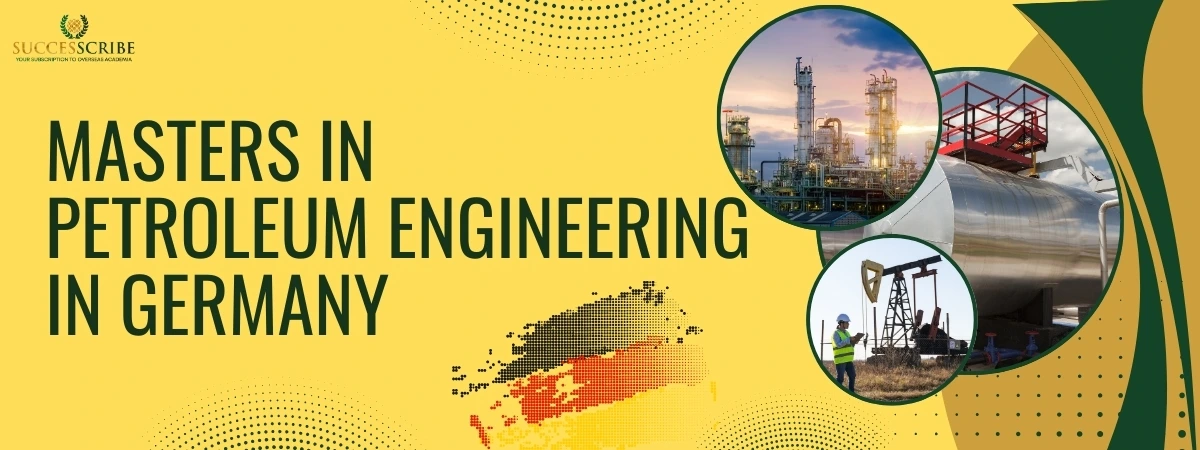Germany offers strong technical education in petroleum-related fields through specialized master’s programs (e.g., Petroleum Engineering, Energy Engineering, Mining/Oil & Gas), excellent lab and research facilities, and a pathway to work in Europe’s energy sector. Programs are fewer than in major oil-producing countries but are highly technical, often tied to mining, reservoir engineering, geothermal and energy systems. International students benefit from low/no tuition at many public universities, generous research opportunities, and clear post-study pathways. Pursuing a Masters in Petroleum Engineering in Germany equips you with the expertise to tackle the world’s most pressing energy challenges.
Key Highlights – Masters in Petroleum Engineering in Germany
- Top Universities: TU Clausthal, TU Freiberg, RWTH Aachen, KIT, Leibniz Hannover.
- Cutting-Edge Curriculum: Drilling, reservoirs, EOR, CCS, geothermal & hydrogen.
- Affordable Costs: Mostly tuition-free; semester fees €100–€350; living costs €850–€1,200/month.
- Scholarships: DAAD, Deutschlandstipendium (€300/month), others up to €1,000.
- Admission: Bachelor’s in engineering fields, GPA 2.3–2.7, IELTS 6.5+.
- Careers: €60k–€90k salaries in oil & gas, energy transition & R&D.
- Post-Study Work: 18-month job search visa → EU Blue Card → PR & citizenship in 5 years.
Why Germany for a Petroleum Engineering Master’s?

Here are the top reasons why choose Masters in Petroleum Engineering in Germany:
- Academic Excellence & Innovation: German technical universities (Technische Universitäten or TUs) are consistently ranked among the best in the world. Their research in subsurface engineering, material science, and energy systems is cutting-edge.
- Focus on the Future Energy Mix: German programs are not stuck in the past. They are actively integrating modules on geothermal energy, carbon capture utilization and storage (CCUS), hydrogen economy, and energy sustainability. This makes graduates highly adaptable.
- Strong equipment and institute infrastructure: Institutes such as those at Clausthal University of Technology, TU Bergakademie Freiberg and other technical universities have dedicated facilities for drilling, reservoir simulation, and subsurface research.
- Extremely Low Tuition Costs: Compared to the US, UK, or Australia, where a Master’s can cost anywhere from €30,000 to €80,000, the near-free tuition in Germany is an unparalleled advantage.
- Interdisciplinary scope relevant to energy transition: Modern petroleum programs in Germany commonly cover topics beyond hydrocarbons: reservoir engineering, enhanced recovery, environmental protection, CO₂ storage, geothermal energy and energy systems integration, making graduates useful in energy transition jobs.
- Strong Industrial Economy: Germany is home to massive energy companies (e.g., Wintershall Dea, RWE, Uniper), world-leading industrial giants (Siemens, BASF), and a dense network of specialized Mittelstand (mid-sized) companies in the supply chain. This provides excellent internship and job opportunities.
- Post-Study Work Opportunities: Germany offers an 18-month post-study residence permit to search for a job related to your degree. Once you secure a job, obtaining a EU Blue Card or a settlement permit is straightforward.
- Life in Europe: Living in Germany offers a high quality of life, rich culture, and the opportunity to travel easily across Europe.
Suggested Post: Banks in Germany for International students
Top universities offer Petroleum-related degrees in Germany?
Choosing Germany for this master’s means placing yourself at the heart of Europe’s industrial and energy innovation hub. While Germany may not have an abundance of standalone “Petroleum Engineering” master’s programs as seen in major oil-producing countries, it truly shines in several specialized, high-quality offerings. These programs are hosted at leading technical universities and are often embedded within subsurface, mining, energy, or resource engineering faculties. Here’s a closer look at the Universities offering Masters in Petroleum Engineerign in Germany:
1. Clausthal University of Technology (Technische Universität Clausthal)
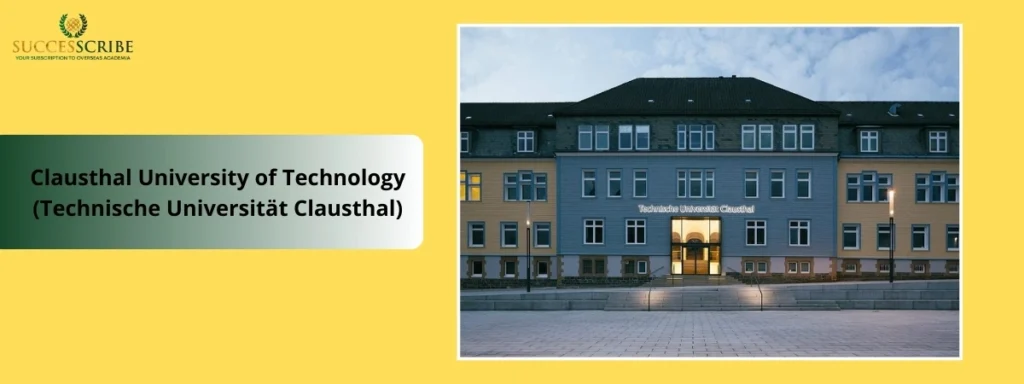
TU Clausthal is Germany’s top destination for petroleum studies. It is known for its Institute of Subsurface Energy Systems and strong ties with the oil & gas industry worldwide.
| Program Name | Duration | Language | Specialization Highlights | Tuition Fees | Notes |
| MSc Petroleum Engineering | 2 years (4 semesters) | English | Drilling, Reservoir Engineering, Production Engineering | €0 (public, only semester fee €350/semester) | Most petroleum-focused program in Germany |
| MSc Energy and Mineral Resources | 2 years | English | Combines petroleum, natural gas, and renewable energy | €0 (public, semester fee applies) | Interdisciplinary with future-oriented energy technologies |
| MSc Mining Engineering (with Petroleum Modules) | 2 years | English | Subsurface resource extraction including hydrocarbons | €0 (semester fee) | Includes petroleum-related research |
2. Freiberg University of Mining and Technology (TU Bergakademie Freiberg)
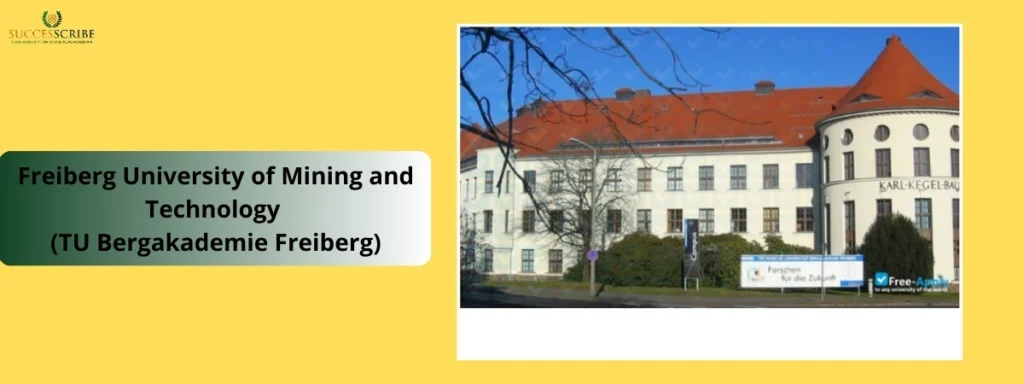
Germany’s oldest mining university (founded 1765), Freiberg specializes in resources, raw materials, and energy engineering.
| Program Name | Duration | Language | Specialization Highlights | Tuition Fees | Notes |
| MSc Petroleum Engineering (offered via partnerships) | 2 years | English | Advanced drilling & reservoir management | €0 (semester fee €250) | Limited seats, industry-backed` |
| MSc Geoengineering and Reservoir Geoscience | 2 years | English | Petroleum geoscience, reservoir modeling | €0 (semester fee) | Strong petroleum geoscience focus |
| MSc Sustainable Mining & Energy Resources | 2 years | English | Petroleum + renewable integration | €0 | Oriented towards future energy balance |
3. RWTH Aachen University
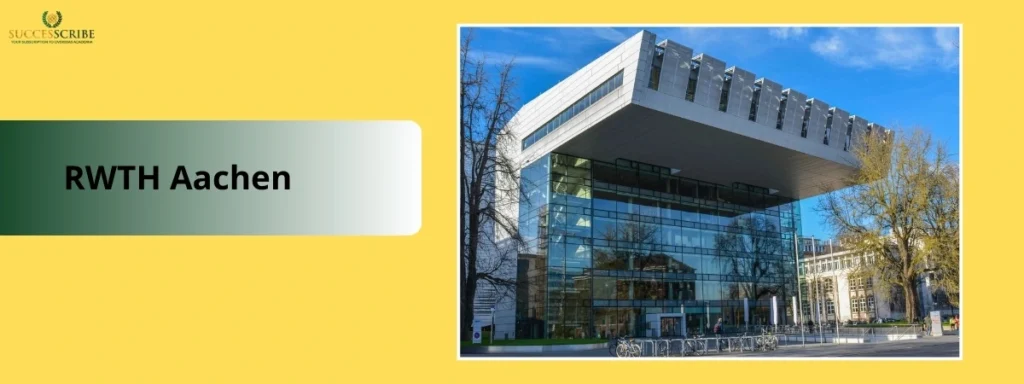
RWTH Aachen is one of Europe’s leading technical universities. Its Faculty of Georesources and Materials Engineering offers energy programs connected to petroleum technology.
| Program Name | Duration | Language | Specialization Highlights | Tuition Fees | Notes |
| MSc Energy Engineering | 2 years | English | Fossil fuels, renewables, thermal power plants | €0 (semester fee €300) | Includes modules on petroleum/natural gas |
| MSc Raw Materials Engineering | 2 years | English | Petroleum exploration, energy raw materials | €0 | Interdisciplinary with mining & petroleum focus |
| MSc Applied Geosciences (Petroleum Modules) | 2 years | English / German | Petroleum geology, hydrocarbon reservoirs | €0 | Research-based |
4. Leibniz University Hannover
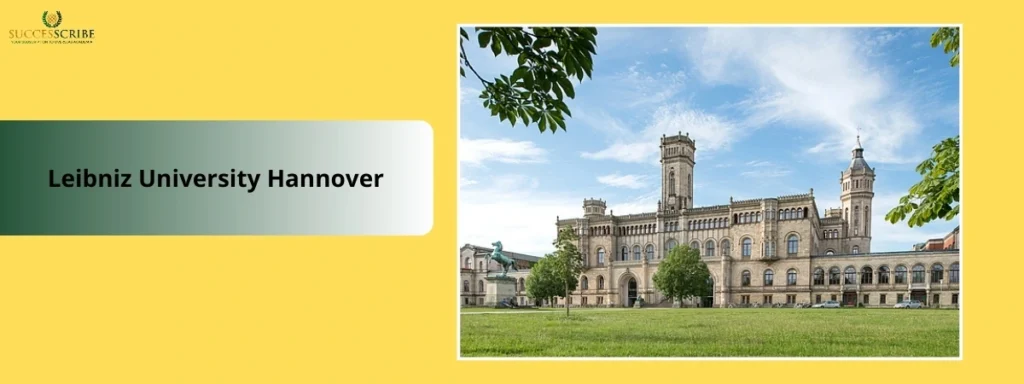
Leibniz University Hannover offers petroleum-related studies through Energy and Georesources programs, with collaboration from industry players like Wintershall Dea.
| Program Name | Duration | Language | Specialization Highlights | Tuition Fees | Notes |
| MSc Energy and Process Engineering | 2 years | English | Petroleum refining, energy conversion | €0 (semester fee) | Applied petroleum processing |
| MSc Geoengineering & Subsurface Energy Systems | 2 years | English | Reservoirs, CO₂ storage, oil & gas | €0 | Strong subsurface petroleum links |
5. Karlsruhe Institute of Technology (KIT)
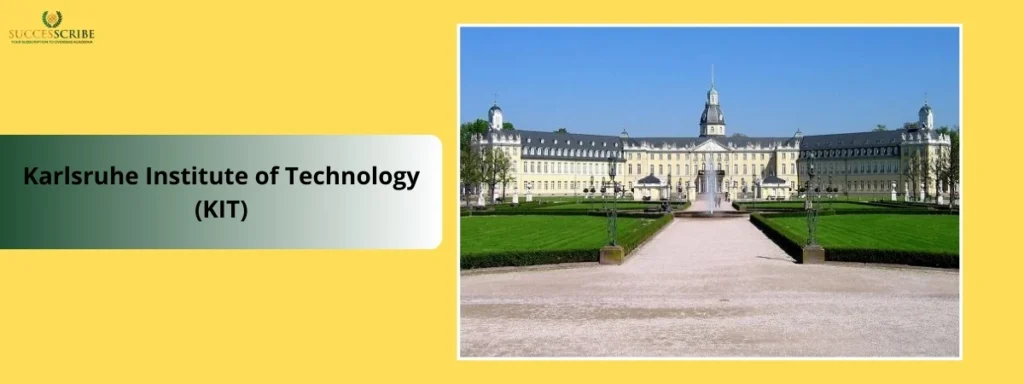
KIT is Germany’s largest research institution, focusing on energy systems engineering. While not a pure petroleum program, it has fossil energy, petroleum refining, and reservoir modules.
| Program Name | Duration | Language | Specialization Highlights | Tuition Fees | Notes |
| MSc Energy Engineering and Management | 2 years | English | Petroleum, natural gas, energy systems | €1,500/semester (if non-EU) | Industry-focused program |
| MSc Geoenergy Engineering | 2 years | English | Petroleum + geothermal reservoirs | €0 (public tuition) | Petroleum & renewable hybrid |
Program structure, typical syllabus and learning outcomes
Most MSc programs in this field are research-and-application oriented and include:
- Core engineering courses: Reservoir engineering, fluid mechanics, rock mechanics, drilling engineering, production engineering, petrophysics.
- Modeling & simulation: n,umerical reservoir simulation, finite-element methods, computational modeling, well-test analysis.
- Energy & environment modules: CO₂ sequestration (CCS), environmental protection, produced water management, hydrogen and geothermal technologies (integrated modules).
- Electives / specialization: enhanced oil recovery (EOR), drilling automation, well integrity, petroleum economics, data science for subsurface (digital oilfield).
- Laboratory & field exercises: Core analysis labs, well-testing labs, seismic & geophysical lab work (where available).
- Master’s thesis: Typically 6–12 months, often in partnership with industry or research centers.
Learning outcomes: Able to design and analyze wells, evaluate reservoirs, run reservoir simulations, evaluate EOR strategies, integrate environmental and regulatory concerns, and apply data analytics to subsurface problems.
Admission Requirements – What Admissions Committees Look For
Graduates with a Masters in Petroleum Engineering in Germany are highly sought after by top energy companies and research institutions worldwide. Gaining admission to a Master’s in Petroleum Engineering (or related programs in Energy, Resources, and Natural Sciences) in Germany is competitive. German universities evaluate candidates not just on academic performance but also on language ability, professional preparedness, and motivation.
1. Academic Qualifications
- Bachelor’s Degree: A strong academic foundation in Petroleum Engineering, Mechanical Engineering, Chemical Engineering, Geosciences, Mining, or related fields is required.
- Minimum GPA / Percentage:
TU Clausthal: Minimum GPA equivalent to 2.5 on the German scale (75% in Indian system).
RWTH Aachen: Typically requires at least 2.3 GPA (~78-80%).
Course Prerequisites: Universities expect prior coursework in subjects such as:
- Fluid Mechanics
- Thermodynamics
- Reservoir Engineering
- Drilling & Production Technologies
| University | Required Bachelor’s Background | Minimum GPA Requirement | Additional Notes |
| TU Clausthal | Petroleum Eng., Mining, Energy Eng. | 2.5 (German scale) | Strong focus on practical training |
| RWTH Aachen | Mechanical Eng., Chemical Eng., Resources Eng. | 2.3 (German scale) | Requires strong fundamentals in thermodynamics |
| TU Freiberg | Mining, Geoengineering, Petroleum Eng. | 2.7 | Accepts interdisciplinary backgrounds |
2. Language Proficiency
Most petroleum-related Master’s programs in Germany are taught in English. However, some may include modules in German.
| Language Test | Minimum Score Required |
| IELTS | 6.5 – 7.0 |
| TOEFL iBT | 90 – 95 |
| TestDaF / DSH (for German-taught courses) | B2 – C1 |
Suggested Post: RWTH Aachen University language requirements
3. Professional Experience (Optional but Strong Advantage)
- While not mandatory, having 1–2 years of work experience in petroleum, oil & gas, energy, or mining significantly improves chances of admission.
- Some German programs report that 30–40% of successful applicants have relevant industry experience.
4. Statement of Purpose (SOP) & Motivation Letter
Admissions committees place high importance on the Motivation Letter (1–2 pages).
It should highlight:
- Why petroleum / energy studies in Germany?
- Career goals (R&D, exploration, energy transition, sustainability).
- Alignment with university research focus (e.g., drilling technology, carbon capture, hydrogen storage).
5. Letters of Recommendation
Typically 2 academic recommendation letters are required.
Universities prefer referees who can attest to:
- Technical knowledge (e.g., petroleum systems, drilling
- Research ability
- Teamwork & leadership
6. Other Key Requirements
| Requirement | Typical Expectation |
| CV / Resume | Academic + industrial experience |
| GRE (optional) | Rarely required, but scores above 300 can strengthen international applications |
| Portfolio (if asked) | Research abstracts, project reports |
| Interview | Conducted by some universities like RWTH Aachen for shortlisted candidates |
Costs, Tuition, Living Expenses & Scholarships for Masters in Petroleum Engineering in Germany
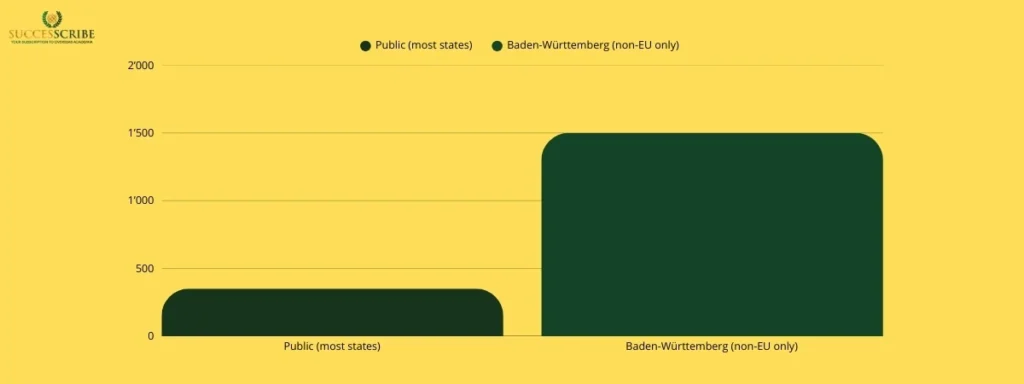
Most public German universities do not charge tuition fees, even for international students. You typically only pay a semester contribution (Semesterbeitrag), ranging from about €100 to €350, which covers administrative costs, student services, and often a public transport pass. In some states like Baden-Württemberg, non-EU students may be required to pay higher fees (€1,500 per semester)
Tuition & Semester Contributions
| Type of University / Role | Fee Type | Amount (per semester) |
| Public (most states) | Semester contribution | €100 – €350 |
| Baden-Württemberg (non-EU only) | Tuition-like fee | €1,500 |
1. Living Expenses (Monthly Estimates)
Monthly living costs vary by city, lifestyle, and housing type. Here’s a breakdown of typical student expenses in 2025:
| Expense Category | Estimated Monthly Cost (EUR) |
| Rent (Dorm shared / WG / Private) | €200 – €1,200 depending on city/type |
| Groceries + Food | €150 – €300 |
| Health Insurance (public) | €110 – €150 |
| Public Transport | Often included: if not, €30 – €60 |
| Utilities & Internet | €100 – €250 |
| Study Materials, Mobile plan | €30 – €100 |
| Leisure & Miscellaneous | €50 – €150 |
| Total Estimate | €850 – €1,200+ |
2. Visa Financial Proof (Blocked Account)
To get a German student visa, you’ll typically need to demonstrate €992 per month (€11,904 per year) in a blocked account (Sperrkonto). This reflects the government-estimated minimum living expenses for visa approval.
3. Scholarships & Financial Aid
Germany offers a variety of funding options for international students. Key scholarships and aid include:
| Scholarship / Aid | Monthly Amount | Notes |
| DAAD Scholarships | Varies | Covers tuition, living costs, travel; competitive |
| Deutschlandstipendium (“Germany Scholarship”) | €300 | Merit-based, partly funded by private partners |
| Heinrich-Böll / Friedrich Ebert / Others | €800 – €1,000+ | Variable; often includes living allowance, insurance |
| BAföG (for eligible students) | Up to €935 | Half grant, half interest-free loan; capped on repayment |
| Studienstiftung (German National Academic Foundation) | Up to €855 (+300) | Neural funding + insurance, for top academic performers |
4. Estimated Annual Budget Summary
Combining tuition contributions, living costs, and visa requirements, here’s a clear annual cost overview:
| Cost Category | Estimated Annual Cost (EUR) |
| Semester Contributions (2 semesters) | €200 – €3,000 depending on fees |
| Living Expenses (€850 – €1,200 × 12 months) | €10,200 – €14,400 |
| Total Annual Budget | €10,400 – €17,400 |
Suggested Post: Jobs after masters in Germany
Career Prospects & Salary Expectations – Petroleum Engineering Graduates in Germany
Graduates of a Masters in Petroleum Engineering in Germany often step directly into roles with salaries ranging from €55,000 to €90,000 annually, making it one of the most lucrative engineering pathways. Graduates with a Master’s in Petroleum Engineering (and related subsurface or energy programs) in Germany typically find roles in:
- Reservoir Engineering
- Drilling & Production Engineering
- Data-driven Subsurface Modeling & Digital Oilfield
- Energy Transition roles (geothermal, CO₂ storage, hydrogen storage)
- Consultancy & R&D Institutes
Fields like energy transition are increasingly absorbing traditional petroleum skills, enhancing employability and long-term relevance.
| Role & Experience Level | Gross Annual Salary (EUR) |
| Entry-level Petroleum Engineer | €60,200 – €63,000 |
| Median Petroleum Engineer (all levels) | €69,000 |
| Experienced Petroleum Engineer (Germany) | €60k – €82k+ |
| Petroleum Engineer (Hamburg-specific) | €75,000 (median), Range: €65k–€82k |
Suggested Post: Entrepreneurship courses in Germany
Post-study work, visas and long-term migration
Completing a Masters in Petroleum Engineering in Germany opens the door to an 18-month post-study work visa, creating a smooth transition into Europe’s energy workforce. This allows you to live in Germany while looking for a job relevant to your qualifications. During this period, you may accept any form of employment, including short-term or part-time work, to support yourself.
| Feature | Details |
| Permit Duration | 18 months after graduation |
| Work Allowed | Any job (not necessarily in your field) to support living expenses |
| Key Requirements | Proof of degree, health insurance, financial means; start job search early, ideally 4 months before end of studies |
EU Blue Card (for Skilled Workers)
The EU Blue Card is a highly attractive pathway for international professionals. You must secure a relevant job offer with a salary meeting Germany’s thresholds. The 2025 thresholds are:
- General occupations: €48,300/year (€4,025/month)
- Shortage occupations (STEM, engineering, recent graduates, etc.): €43,759.80/year (€3,647/month)
Advantages of the Blue Card:
- Issued up to 4 years (or contract length + 3 months)
- Enables free intra-EU mobility after 12 months
Path to Permanent Residency
- After 27 months with the Blue Card, you can obtain a settlement permit
- With German B1-level proficiency, this reduces to 21 months
Skilled Immigration Act & “Opportunity Card”
Germany’s Skilled Immigration Act (Fachkräfteeinwanderungsgesetz) came into effect in July 2023, introducing several favorable reforms:
- Lowered Blue Card salary thresholds (see above)
- A new “Opportunity Card” for graduates, allowing entry-level job seekers to stay up to one year initially, extendable by two more years with qualifying employment
- Reformed naturalization rules: citizenship eligibility reduced to 5 years (or 3 years in special cases), and dual citizenship is now widely accepted
Long-Term Permanent Residency (Settlement Permit)
Here’s how you can transition to permanent residence in Germany:
| Route | Timeline & Conditions |
| EU Blue Card → Settlement Permit | 27 months on Blue Card; or 21 months with B1 German |
| Work Visa (non-Blue Card) | After 4 years of contributions and employment with recognized qualifications |
| Naturalization (citizenship) | After 5 years of lawful residence (or 3 years in exceptional cases) + B1 German + civic test; dual citizenship now accepted |
Conclusion
The Masters in Petroleum Engineering programs in Germany represent an excellent investment in professional development, offering students the knowledge, skills, and connections necessary for successful careers in the evolving energy sector. With careful planning and commitment, international students can leverage these programs to achieve their career aspirations while contributing to the global transition toward sustainable energy solutions. With its mix of world-class education, affordable tuition, and global career prospects, a Masters in Petroleum Engineering in Germany stands as a life-changing decision for ambitious engineers.
FAQs
Are there many English-taught petroleum master’s programs in Germany?
Not many use the exact title “Petroleum Engineering,” but relevant English-taught masters exist in subsurface engineering, mining, oil & gas, and energy engineering. Always search for program modules relevant to reservoirs, drilling, and subsurface energy.
Will studying petroleum engineering in Germany restrict me to oil & gas only?
No. German programs increasingly integrate geothermal, CCS, and hydrogen storage modules; graduates are well-positioned for energy transition roles.
How much does it cost to study?
Many public universities have no tuition fees; expect monthly living costs of roughly €900–€1,200 (varies by city). Scholarships (DAAD etc.) can further reduce costs.
What is the job-seeker period after graduation?
Non-EU graduates can typically get an 18-month job-seeker extension to find employment related to their degree, then convert to a work permit or EU Blue Card.
What salary should I expect?
Reports vary by data source. Aggregates show ranges from €60k–€90k for many roles; other surveys report average values that can be higher depending on seniority and employer (e.g., large corporates). Treat published averages cautiously and research employer-specific packages.
Related Post
Masters in Data Science in Germany
Entrance exam for masters in Germany
Masters in Cyber Security in Germany
Masters in Public Health in Germany

